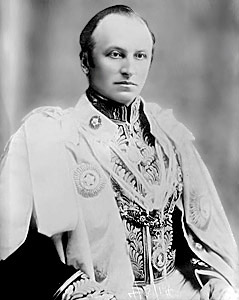At first glance it seems a foregone conclusion. Farage and UKIP have been setting the political agenda on Europe for the last two years, scooping up second place in Westminster by-elections and effectively bouncing David Cameron into holding an EU referendum (which I thought then was a stupid move, and still do). UKIP have displaced the Lib Dems as the protest party of choice, consistently polling around 15-20% to the yellows' 10%. Add to this Farage's ability to connect to the common man by drawing on talk of the 'out-of-touch Westminster elites' and it looks like victory is within spitting distance for Nigel.
Yet for all that, my bet would be that Clegg pulls off a surprise triumph on the night. In a head-to-head TV debate on the EU, Farage's biggest strengths could well turn out to be his greatest weaknesses. The meteoric rise of UKIP as a political force has been accompanied by a disproportionately large share of media coverage. While they have succeeded in getting a referendum on EU membership, the noise in that debate has been almost entirely emanating from the 'Out' camp and UKIP. The 'In' case has barely let out a squeak. What's even more interesting is that despite the one-sided nature of press coverage, the polls have showed a remarkably narrow gap between those in favour of Brexit and those against. Clegg could therefore be well placed to pick up support from a hitherto ignored group.
And bizarrely, perhaps Nick's greatest advantage is Farage's 'man of the people' persona. Nigel Farage is a fantastic performer when giving a speech to a room full of people, banging his fist on the table and damning the EU with one hand, pint glass in the other. But as we have seen, his emotions can sometimes get the better of him - remember his fury when he got trapped in a pub in Edinburgh, or his overreaction to Anna Soubry's suggestion that he had a finger up his bottom.
That's why I think the smart money's on Nick to be declared the winner. All he has to do is make a credible case for EU membership and manage to subtly provoke Nigel into a rage, while remaining polite and reasonable. And if Clegg doesn't win, he can always say sorry.







 In the dying days of the Ottoman Empire, the 'Eastern Question' was a hot topic among Western powers. Now, over the last 18 months or so, Turkey has again been garnering a lot of international attention, beginning with Prime Minister Erdogan (pictured, with David Cameron) walking out of the Davos forum last year in protest at Israel's Gaza operations, through to voting against sanctions on Iran in a recent UN Security Council meeting. Actions such as these, together with increasingly close ties with Russia and China, have led to the perception that Turkey is 'looking eastwards' after decades (or indeed centuries) of Westernisation. For many this appears to be a cause for concern, a symbol of the decline of Western economies and a country turning away from those that were previously its allies (most obviously Israel). There also appears to be a perception prevalent in the media that Turkey's government is turning the country away from liberal values and instead paving the way to Islamisation (One of the more extreme articles can be seen at
In the dying days of the Ottoman Empire, the 'Eastern Question' was a hot topic among Western powers. Now, over the last 18 months or so, Turkey has again been garnering a lot of international attention, beginning with Prime Minister Erdogan (pictured, with David Cameron) walking out of the Davos forum last year in protest at Israel's Gaza operations, through to voting against sanctions on Iran in a recent UN Security Council meeting. Actions such as these, together with increasingly close ties with Russia and China, have led to the perception that Turkey is 'looking eastwards' after decades (or indeed centuries) of Westernisation. For many this appears to be a cause for concern, a symbol of the decline of Western economies and a country turning away from those that were previously its allies (most obviously Israel). There also appears to be a perception prevalent in the media that Turkey's government is turning the country away from liberal values and instead paving the way to Islamisation (One of the more extreme articles can be seen at